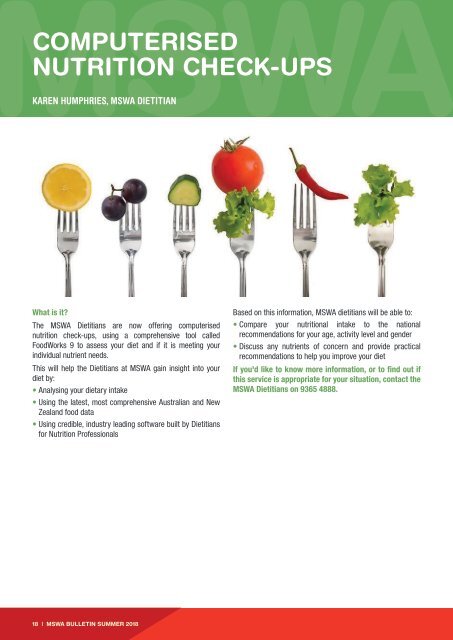You also want an ePaper? Increase the reach of your titles
YUMPU automatically turns print PDFs into web optimized ePapers that Google loves.
COMPUTERISED<br />
NUTRITION CHECK-UPS<br />
DIETARY FIBRE<br />
KAREN HUMPHRIES, <strong>MSWA</strong> DIETITIAN<br />
KAREN HUMPHRIES, <strong>MSWA</strong> DIETITIAN<br />
What is it?<br />
The <strong>MSWA</strong> Dietitians are now offering computerised<br />
nutrition check-ups, using a comprehensive tool called<br />
FoodWorks 9 to assess your diet and if it is meeting your<br />
individual nutrient needs.<br />
This will help the Dietitians at <strong>MSWA</strong> gain insight into your<br />
diet by:<br />
• Analysing your dietary intake<br />
• Using the latest, most comprehensive Australian and New<br />
Zealand food data<br />
• Using credible, industry leading software built by Dietitians<br />
for Nutrition Professionals<br />
Based on this information, <strong>MSWA</strong> dietitians will be able to:<br />
• Compare your nutritional intake to the national<br />
recommendations for your age, activity level and gender<br />
• Discuss any nutrients of concern and provide practical<br />
recommendations to help you improve your diet<br />
If you'd like to know more information, or to find out if<br />
this service is appropriate for your situation, contact the<br />
<strong>MSWA</strong> Dietitians on 9365 4888.<br />
What is dietary fibre?<br />
Dietary fibre is a type of carbohydrate present in some<br />
foods such as vegetables, fruits and grain foods. This fibre<br />
is not absorbed as you digest your food, it ends up in the<br />
large intestine and is fermented by friendly gut bacteria. It<br />
is important to include fibre in your diet as it helps to keep<br />
you feeling fuller for longer, keeps your bowels regular, can<br />
improve cholesterol and blood sugars, supports healthy gut<br />
bacteria, and can even help prevent some diseases such as<br />
bowel cancer, diabetes and heart disease.<br />
There are two main kinds of fibre, insoluble and soluble.<br />
Soluble fibre dissolves in the small intestine in the presence<br />
of water to form a gel-like consistency which slows down<br />
digestion, keeps us feeling fuller for longer and helps the<br />
digested food to move more smoothly through your gut. Foods<br />
high in soluble fibre include fruits, vegetables, legumes, oats<br />
and barley.<br />
Insoluble fibre helps to bulk stools and keep bowel movements<br />
regular. You may like to think of insoluble fibre as the kind<br />
that doesn’t dissolve in water, instead it works like a ‘brush’<br />
that keeps our intestines clean. Foods high in insoluble fibre<br />
include wholegrain breads and cereals, nuts, seeds, fruit and<br />
vegetable skin, legumes and beans.<br />
How much fibre do you need?<br />
The acceptable adult fibre intake for males each day is 30g of<br />
fibre, and 25g for females.<br />
Eating a variety of plant-based foods will help you get enough<br />
fibre each day.<br />
An example of 30g of fibre per day.<br />
Food source<br />
Amount of fibre<br />
1 cup wholemeal pasta 7.9g<br />
100g kidney beans 6.5g<br />
½ cup rolled oats 4.5g<br />
30g (approx 25) Almonds 2.6g<br />
5 dried apricots 2.5g<br />
1 slice of wholegrain bread 2.4g<br />
1 medium banana 2.3g<br />
1 medium apple 2.2g<br />
Total Fibre 30.9g<br />
Resistant Starch<br />
Another type of carbohydrate that supports good gut health is<br />
resistant starch. Resistant starch is also not absorbed during<br />
digestion in the small intestine; instead it is fermented by<br />
your gut bacteria in your large intestine. This fermentation<br />
process helps the good bacteria and helps to improve overall<br />
bowel health. Foods that are good sources of resistant starch<br />
include slightly green bananas, cooked and cooled potato and<br />
rice, and tapioca.<br />
RECIPE:<br />
Banana and Blueberry Bread<br />
Ingredients<br />
• Olive oil spray<br />
• 4 ripe bananas peeled<br />
• ¼ cup sugar or other sweetener, ie honey<br />
• ½ cup milk<br />
• 2 eggs<br />
• 1 cup self-raising flour<br />
• 1 cup wholemeal self-raising flour<br />
• 1 tsp ground cinnamon<br />
• 1 cup frozen blueberries<br />
Method<br />
Preheat oven to 220ºC (200ºC fan forced). Spray a 20 x<br />
10cm loaf tin with oil, line base and sides with non-stick<br />
baking paper.<br />
Reserve one banana for presentation and mash remaining 3<br />
bananas in a large bowl.<br />
Add sugar, milk and eggs and mix with a fork until well<br />
combined.<br />
Sift flours and cinnamon on top of banana mixture, returning<br />
husks from the sieve to the bowl. Mix ingredients together<br />
until just combined, taking care not to over-mix, then gently<br />
fold through blueberries (or try raspberries/dried fruit).<br />
Spoon mixture into prepared loaf tin and smooth the surface.<br />
Slice remaining banana thinly and overlap slices through the<br />
centre of the loaf.<br />
Bake for 35–40 minutes then cover with foil and bake for<br />
a further 20 minutes. Centre of loaf will remain moist but<br />
not wet when tested with a skewer. Allow to cool in tin for 5<br />
minutes then turn onto a wire rack.<br />
Cut into 1 cm slices before serving.<br />
18 | <strong>MSWA</strong> BULLETIN SUMMER <strong>2018</strong> <strong>MSWA</strong> BULLETIN SUMMER <strong>2018</strong> | 19


















